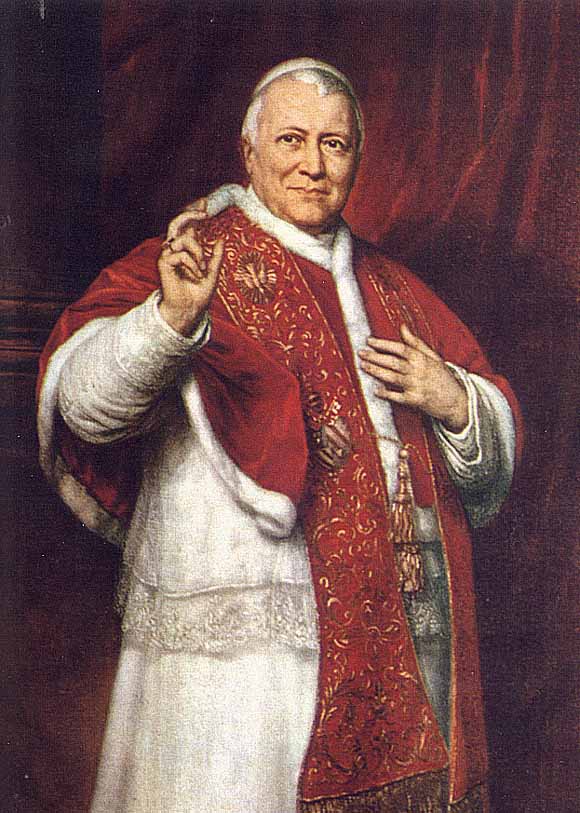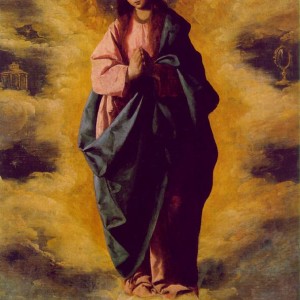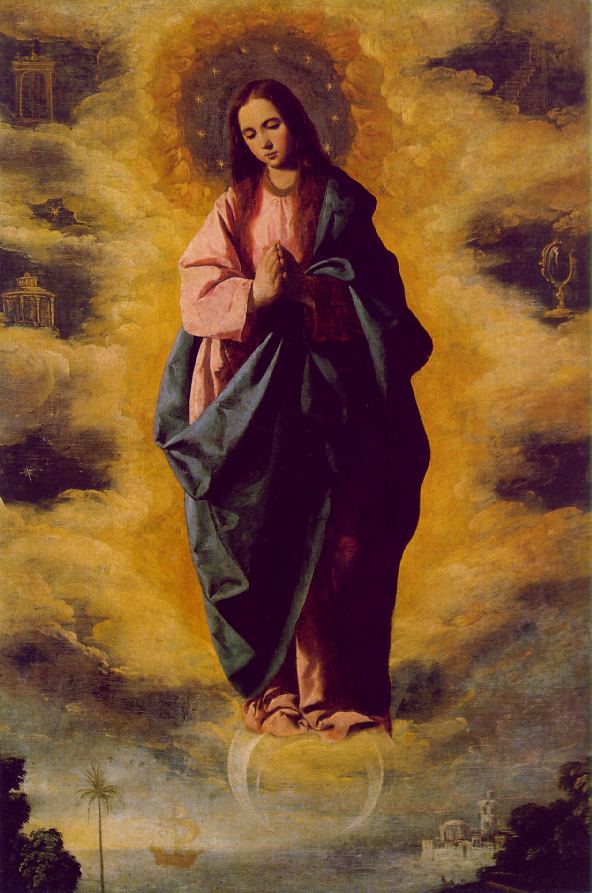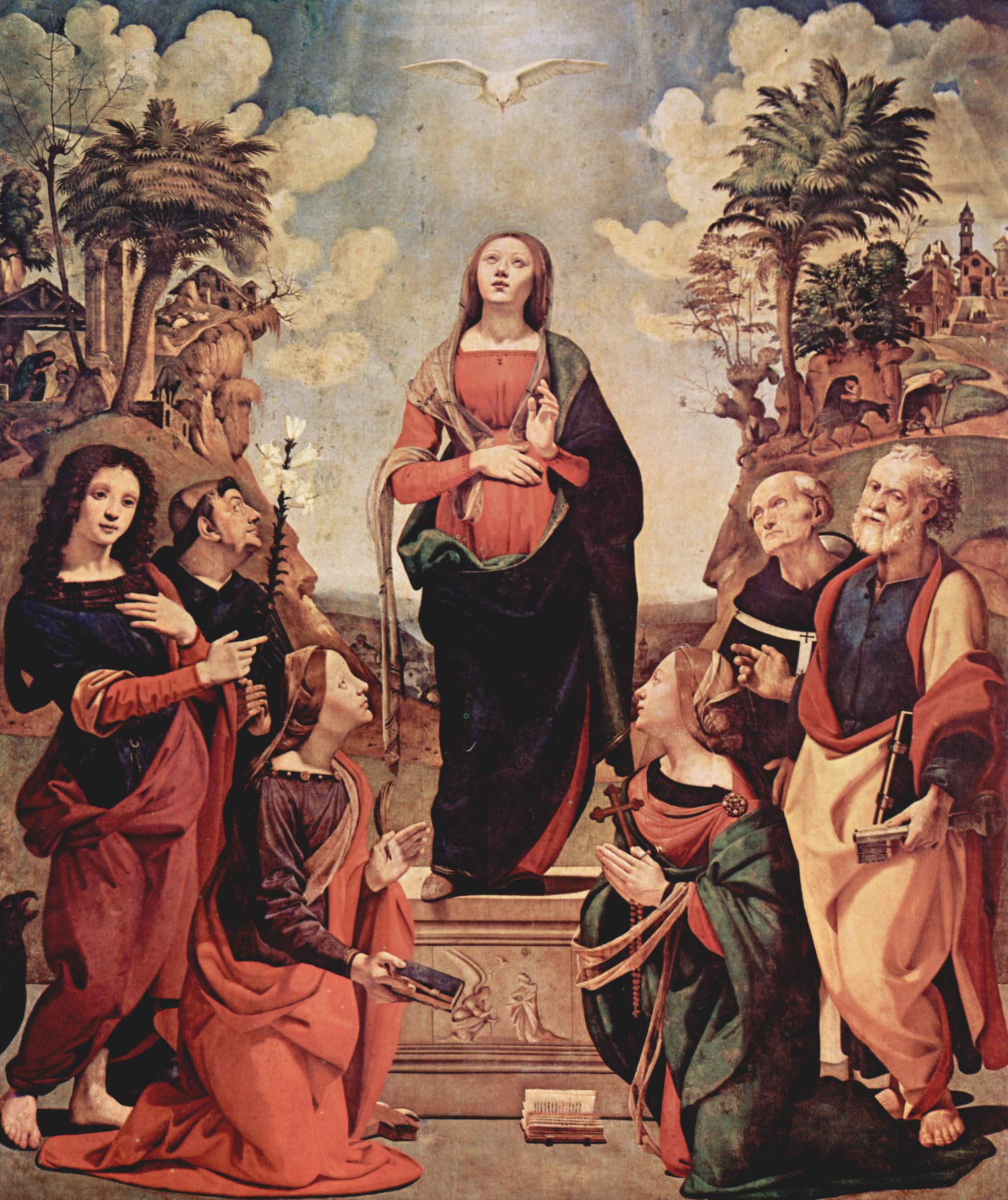Earlier this month, I responded to a number of objections about Mary’s sinlessness raised by a non-denominational reader. That same reader responded, via e-mail. One of his arguments against the Immaculate Conception goes like this:
Francisco de Zurbarán,
Immaculate Conception (1635)Does it concern you that your statement was based on a dogma, the Immaculate Conception, a doctrine, incidentally, rejected by Thomas Aquinas and Ansalen, imposed on the Catholic Church in 1854 by Pius IX? Ten years later, the same pope imposed his infamous “Syllabus of Errors”, which condemned virtually every civil liberty, and was rejected by virtually all Catholics Six years after that, he had the last of the papal states ripped out of his grasping hands by the Italian army. Pius also gave the Church the ex-cathedra-infallible pope and canonized Pedro d-Arbus, a fifteenth century inquisitor who presided over the forced baptism of Jews in Spain. If you reject the syllabus, and I would be surprised if you didn’t, how can you justify accepting the Immaculate Conception? Wouldn’t that make you a cafeteria Catholic?
And remember, this is the reader cherry-picking Christians out of history. If even the ones he cherry pick sound like Catholics on the issue of Mary, could it be that it’s because Catholics are the ones who hold the historic view of Mary? The lack of Mary-bashing prior to the Reformation is because all generations of Christians prior to the Reformation, like those in the Catholic and Orthodox Churches, considered and called Mary blessed. (And yes, I feel comfortable calling this Mary-bashing: elsewhere in his e-mail, he suggests that Mary may have been an apostate).
 |
| Blessed Pope Pius IX |
Having addressed Aquinas and Anselm, what to make of the rest? The Immaculate Conception isn’t true because Pope Pius IX lost control of the papal states? This line of argumentation, such as it is, strikes me as logically incoherent.
But of course, we don’t believe in the infallibility of the definition of the Immaculate Conception because of Pius’ personal sanctity, any more than we believe in the inspiration of Galatians because of Paul’s personal sanctity. In each case, we’re trusting the Holy Spirit’s ability to work through flawed human instruments.
The “cafeteria Catholic” argument is similarly lame. If the only thing necessary to debunk Catholicism is to show that one of the popes was a sinner, the Church would have been done away with a long time ago. By Her own reckoning, the first pope, St. Peter, denied Christ three times. We don’t sweep this under the rug. We read the account of it every Palm Sunday.
So no, there’s no obligation of Catholics to agree with literally everything that the pope says or does, nor does papal infallibility say anything remotely like that. Since the reader references the definition of papal infallibility (that it consists of ex cathedra statements, which Vatican I defined), I think he knows better. Spreading this mischaracterization of papal infallibility only poisons the waters.
The lynchpin of this argument is in the reader’s claim that the doctrine of the Immaculate Conception was “imposed on the Catholic Church in 1854” by Pope Pius IX. This is really two claims: (a) that the doctrine of the Immaculate Conception was imposed, from the top down, upon the Church; and (b) that the doctrine was imposed in 1854. Both of these claims are demonstrably false.
Back in 1661, Pope Alexander VII declared:
Piero di Cosimo, Immaculate Conception (1505) “Concerning the most Blessed Virgin Mary, Mother of God, ancient indeed is that devotion of the faithful based on the belief that her soul, in the first instant of its creation and in the first instant of the soul’s infusion into the body, was, by a special grace and privilege of God, in view of the merits of Jesus Christ, her Son and the Redeemer of the human race, preserved free from all stain of original sin. And in this sense have the faithful ever solemnized and celebrated the Feast of the Conception.”
Now, he said that in 1661, and even then, he’s able to refer to belief in the Immaculate Conception as both (a) a devotion of the faithful, and (b) an ancient devotion. If that doesn’t debunk the notion that the dogma was imposed by the papacy in 1854, I don’t know what would.
Such was the situation the doctrine found itself in for countless centuries: it was believed by ordinary Catholics, celebrated throughout the Church as the Feast of the Conception of Mary, periodically nodded at by the papacy, but not formally defined. In the encyclical defining the dogma, Pope Pius IX describes the groundswell of pressure. And rather than it being pressure from the top down, the pressure is from the grassroots of the Church:
Accordingly, from ancient times the bishops of the Church, ecclesiastics, religious orders, and even emperors and kings, have earnestly petitioned this Apostolic See to define a dogma of the Catholic Faith the Immaculate Conception of the most holy Mother of God. These petitions were renewed in these our own times; they were especially brought to the attention of Gregory XVI, our predecessor of happy memory, and to ourselves, not only by bishops, but by the secular clergy and religious orders, by sovereign rulers and by the faithful.
The papacy was hardly in a hurry to solemnly dogmatize this doctrine, and it did so only after extensive entreaties from ordinary Catholics, and from the bishops of the world. To characterize this as some of nineteenth century imposition of papal power is either ignorant or dishonest, and bad history in either case.



I can just hear it now… the type of people who use polemic like that are the same that would come back saying, “Well..! Maybe he didn’t impose it..! BUT ITS STILL IDOLATRY! The Romanist laity have been apostates for the last fifteen-hundred years anyway!”
But in all seriousness, there is an issue with the definition of the Immaculate Conception that is within the universal Catholic Church, and not simply an exterior, ridiculous attack from a Protestant who really has no orthodoxy to speak of.
There are many Byzantine Catholics, such as Melkite-Greek Catholics, who believe (I think, rightly) that the Papal definition was hasty and unwise of Pius IX. Two complaints often surface: 1) Piux IX used Latin theological language in a definition that was *binding on the Universal Church, in other words, Byzantine Catholics as well.* That was very uncharitable because the language is completely foreign to Byzantine theology. 2) In the infallible definition, Pius IX relied on the Roman Catholic “sensus fidei” but didn’t bother to check the pulse of Byzantine Catholic theological advice or sense of the faith. In some ways Byzantine Catholics were marginalized in the decision, so I have to say, there are valid issues with the decision and it may not have been wise. It has contributed to the Eastern Orthodox fear that Papal Infallibility can erase legitimate Byzantine Tradition and Theology by the stroke of a pen without even considering the venerable Eastern Churches. Now Byzantine theology has to try to adapt and fit the rigid, Latin definition of the Immaculate Conception into their legitimate Catholic expression of the Faith.
The language was not completely foreign to Byzantine theology. The East had various writings with equivalent meaning to the latin form of the immaculate conception. Including works found among Patriarch Photius, Theognostes, Patriarch St. Euthymes, Gregory Palamas, Emperor Paleologus, Patriarch Scholarios, etc
That’s odd. I’m a Latin Rite Catholic with a great love for my Byzantine Brothers, and I was told by many desirous of upholding a truly Byzantine stance on theology that it’s difficult to reconcile the Immaculate Conception as it is described in the definition with Byzantine theology.
If you’re right, I wonder why the Eastern Orthodox have such a problem with the dogma.
Nary a mention of Duns Scotus, I see. Also, last time I checked ‘corpus thomisticum’ text of the comm. on the angelic salutation Aquinas denies the immaculate conception 3x. But it’s true, the Leonine hasn’t given us a critical edition of the text yet, so we can’t no for sure.
The architect of the great schism, Patriarch of Constantinople Photius (~871) in his homily on the Annunciation says that Mary was sanctified “ek Brephous”. Which can be translated as at conception or at the origin or embryonic state.
There’s been devotion to the Immaculate conception all throughout history… Its pretty plain obvious.
Exactly. I do not understand why there is even this LONG and STUPID discussion. The Immaculate Conception has been recognized since the Apostolic Age. but only “formalized” in 1854 as a binding dogma.
I don’t have a problem with it, why should you? It makes perfect sense. NO mortal can bear pregnancy and labor to a HOLY GOD who is all-pure and sinless. That is why Mary was given special grace before Adam & Eve was created.
Doesn’t it makes sense that Mary fulfills the Holy Trinity in such a mysterious way?
Mary = Daughter of God the Father
Mary = Mother of God the Son
Mary = Wife of God the Holy Spirit
I don’t have a problem with it, why should you? It makes perfect sense. NO mortal can bear pregnancy and labor to a HOLY GOD who is all-pure and sinless. That is why Mary was given special grace before Adam & Eve was created.
Doesn’t it makes sense that Mary fulfills the Holy Trinity in such a mysterious way?
Mary = Daughter of God the Father
Mary = Mother of God the Son
Mary = Wife of God the Holy Spirit
Now read Romans 3:23 and deny scripture.
Dirham said –
[—
That is why Mary was given special grace before Adam & Eve was created.
—]
Mary’s special grace happened at the moment of conception. Not before Adam and Eve.
Dirham said –
[—
Mary = Daughter of God the Father
—]
Mary was the daughter of Anna and Joachim. Not God.
Dirham said –
[—
NO mortal can bear pregnancy and labor to a HOLY GOD who is all-pure and sinless.
—]
Mary was not Divine. She was of human nature. We believe is one God and Mary is not part of the Trinity.
Why do I get the distinct feeling your friend has never read the “infamous” Syllabus of Errors? Here is a link: http://www.ewtn.com/library/papaldoc/p9syll.htm Far from standing against “every civil liberty” Pio Nono defends the existence of God (1) and his action in the world (2), the right of the Church to govern herself apart from undue interference of the State (20), condemns the unlimited power of the State (39), the idea that law can be completely divorced from morality and God (56), defends Christ’s teaching against divorce (67), condemns the idea that marriage is to be regulated solely by the State – we see where that is leading [“gay” marriage](73), and makes the case that allowing unlimited varieties of worship will lead to mass indifferentism (79) [also proven all too true]. Hardly “infamous”. The claim the Syllabus was rejected by “all Catholics in six years,” is also mistaken. The teachings in the Syllabus are complimented and built upon by Vatican I and Pope Leo XIII.
By the same logic…
There were some Christians in the Early Centuries of the Church (Arians) who did not believe that Jesus was fully divine. Therefore Jesus is not fully divine and it was imposed upon the Church by the Council of Nicaea.
Aim at Mary, hit Jesus.
I had gotten the impression that Aquinas simply thought that the Immaculate Conception wasn’t necessary. Or am I getting that confused with one of his periods of affirmation of the IC?